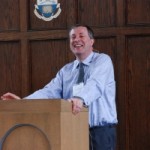There is an insightful article by Alister McGrath at ABC the Drum on Science and Christianity; the following is a summary. I’ve listed some suggestions for further reading at the end.
In the article, McGrath comments on the “New Atheists” aggressive proclamation against belief in God, and goes on to talk about what Science can prove, and what it assumes about the origins of our wonderful universe. He writes, “Science is indeed one of the most successful and exciting ways of making sense of our universe.” But adds that science is focused on method, “of making sense of things.” Which is an ongoing exercise with changing conclusions.
He makes the point that while many atheists put down Christians for believing in a supreme being without proof, “science regularly posits the existence of things whose existence cannot be proved to make sense of our observations.” There are many things scientists presume without being able to see them or prove they exist, such as the existence of “dark matter.” In fact outside of mathematics and logic, there are surprisingly few things that can be absolutely proven. He points out how we ” mostly judge theories by how much sense they make of observations. Power to explain is widely regarded as an indicator of truth. Observations don’t prove theories; rather, theories explain observations, and are judged on the quality of those explanations.”
Theories are common in science, and can be held to for a very long time before “absolute proof” is found, if indeed it can be. He uses the “big bang” theory as an example, which is currently accepted “mainly because it is more consistent with our observations of the universe than its “steady state” rival. It can’t be proved (after all, it’s a singular event). But it does make a lot of sense of things.”
Rather than running away from the reality of life, the universe and everything, Christianity looks to faith to find meaning and sense in the midst of all of lifes’ complexities, contradictions and perplexities; personal, societal and universal. Some religious people use faith as an excuse to deny the realities of life, and the challenges of scientific discovery. On the other hand, some atheists jump to unfair and distorted conclusions in their dogmatic refusal to accept that the existence of God cannot be disproven or proven.
McGrath writes, “For Christians, faith is not a blind leap into the dark, but a joyful discovery of a bigger and clearer picture of things, of which we are part.” He quotes French social commentator and activist Simone Weil who talked about the judging Christianity as you do “the power of a torch… by its ability to illuminate the world’s shadows.” McGrath points to how the apostle John wrote about Jesus being “light of the world” – and how as the Son of God he has “power to illuminate the dark matter of our soul and our world.”
He continues; “So how does the Christian faith light up the shadowlands of life? The Christian tradition speaks of God as someone who makes sense of the puzzles and enigmas of life, illuminating our paths as we travel.” McGrath adds that Chief Rabbi Jonathan Sacks made the point. that “science takes things apart to see how they work. But religion puts them back together again to see what they mean.”
Science explains and helps us understand how particular parts of the material universe function and work together. Religion sheds some light on what it is all about, the meaning and “big picture” behind it all that helps us see our place in it all.
McGrath concludes, “The Christian vision, enacted and proclaimed in the Christmas story, is that of a God whose tender affection for humanity led him to enter our history as one of us. At Christmas, we recall that God is one who tells us he’s there, shows us what he’s like, and accompanies us as we journey – even through the darkest and loneliest valleys of life.”
Alister McGrath is Professor of Theolo gy at King’s College London, and President of the Oxford Centre for Christian Apologetics. He is currently writing a new biography of the Oxford apologist and writer C.S. Lewis.
gy at King’s College London, and President of the Oxford Centre for Christian Apologetics. He is currently writing a new biography of the Oxford apologist and writer C.S. Lewis.
- Read the full article at ABC the Drum;
- You can watch a debate between Alister McGrath and Richard Dawkins on YouTube;
- You can find more about Alister McGrath on his Facebook page; and his website.


